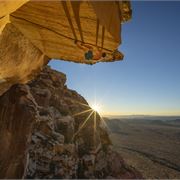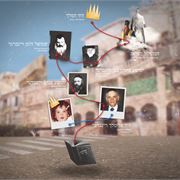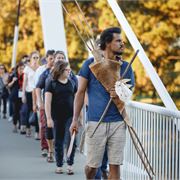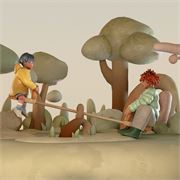
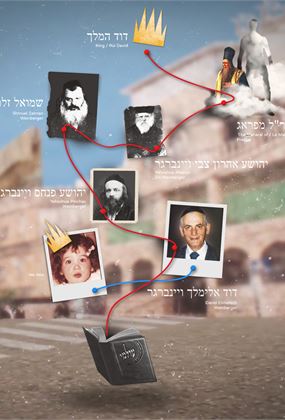
XR Identity
Fri
26
Fri 26 May 4:00 PM
Auckland Central Library
General Admission
66 Mins
Alex Honnold: The Soloist
Alex Honnold is one of the world's most famous free-climbers and many viewers were left wincing upon witnessing some of his more dangerous climbs in the documentary Free Solo. The Soloist further immerses the viewer in Honnold's world, by placing them in the position of a free climber carrying out a dangerous mission. This exhilarating experience will leave you breathless, as you travel to the European Alps and get swept up in a rip-roaring adventure. Even those who aren't climbing enthusiasts will find themselves relating to Honnold's desire for total freedom.
Blood Relations
“What makes us who we are?” is the question that drives this whimsical VR experience about an adopted child and an ancestral mystery. Using vintage objects, photographs and ephemera, the narrator takes us on a poignant quest, from a scrapyard in Vancouver to the Orthodox Jewish community of Bnei Brak and back to a decaying farm in rural Manitoba. Each discovery adds to the visual and narrative collage, building to a surprising conclusion that invites us to explore our own personal stories.
Galup
This Aussie VR film was produced with the goal of bringing attention to an under-discussed aspect of Australia's colonial history. Aboriginal Elder Doolann-Leisha Eatts spent decades raising awareness about Australia's racist past and in this short film, she tells the story of what really happened at Galup / Lake Monger in moving detail.
Festivals: Slamdance, Sheffield DocFest, St Kilda Film Festival, Western Australian Museum
Aboriginal and Torres Strait Islander viewers are advised that this film contains the names, images and voices of people who have passed away. Names, images and voices are used with permission.
Kindred
The gruelling process that potential adoptive parents have to go through is given a personal touch by this warmhearted example of digital storytelling. Bambou Kenneth considers the flaws embedded into the adoption system in a non-judgmental manner and pushes us to take a more open-minded view of those who wish to serve as singe parents. This is one of those rare projects that speaks to several important discussions that are currently being had in the United Kingdom and it will likely have a notable impact on the discourse.
Alex Honnold is one of the world's most famous free-climbers and many viewers were left wincing upon witnessing some of his more dangerous climbs in the documentary Free Solo. The Soloist further immerses the viewer in Honnold's world, by placing them in the position of a free climber carrying out a dangerous mission. This exhilarating experience will leave you breathless, as you travel to the European Alps and get swept up in a rip-roaring adventure. Even those who aren't climbing enthusiasts will find themselves relating to Honnold's desire for total freedom.
Blood Relations
“What makes us who we are?” is the question that drives this whimsical VR experience about an adopted child and an ancestral mystery. Using vintage objects, photographs and ephemera, the narrator takes us on a poignant quest, from a scrapyard in Vancouver to the Orthodox Jewish community of Bnei Brak and back to a decaying farm in rural Manitoba. Each discovery adds to the visual and narrative collage, building to a surprising conclusion that invites us to explore our own personal stories.
Galup
This Aussie VR film was produced with the goal of bringing attention to an under-discussed aspect of Australia's colonial history. Aboriginal Elder Doolann-Leisha Eatts spent decades raising awareness about Australia's racist past and in this short film, she tells the story of what really happened at Galup / Lake Monger in moving detail.
Festivals: Slamdance, Sheffield DocFest, St Kilda Film Festival, Western Australian Museum
Aboriginal and Torres Strait Islander viewers are advised that this film contains the names, images and voices of people who have passed away. Names, images and voices are used with permission.
Kindred
The gruelling process that potential adoptive parents have to go through is given a personal touch by this warmhearted example of digital storytelling. Bambou Kenneth considers the flaws embedded into the adoption system in a non-judgmental manner and pushes us to take a more open-minded view of those who wish to serve as singe parents. This is one of those rare projects that speaks to several important discussions that are currently being had in the United Kingdom and it will likely have a notable impact on the discourse.





